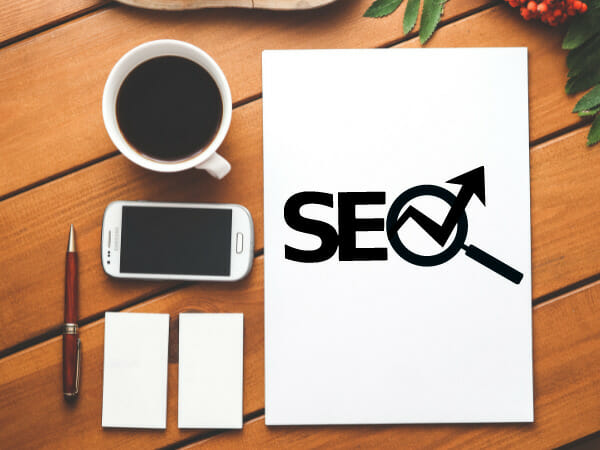Small business SEO guide for 2022
If you’re a local business owner, you should have noticed how your customers use tech tools and services more often. Look into it further, and you’ll see that these things are letting them find your competitors! As digital marketing becomes the norm, reading a small business SEO guide becomes more important than ever.
This is why you might already have started a website for your company, but there’s a problem. You noticed that there’s barely anyone visiting your site, so you’re not getting more customers! If that’s the case, you have to perform search engine optimization (SEO). It will help your website rank higher on search results, and it will barely cost you a dime!
First, I will explain further why small business owners like you need SEO. After that, I’ll go through the steps you can take to make sure your website appears higher up on Google search results. As I said, you can follow all these steps without spending more money, but they will take more time and effort. For best results, you’ll need a mix of free and paid methods!
Why do small businesses need SEO?

People are more connected to the internet than ever. Nowadays, we spend more time on computers and smartphones to use all sorts of online services.
For example, it’s become a daily habit of checking social media like Facebook and Twitter. Whenever they need a product or service, they turn to online search engines.
This means sites like Google are the first ways they find businesses nowadays. A single search query can yield thousands of results, so there’s no way they could look at each one!
As a result, people just click the options on the first page and ignore the options deeper in the list. If yours isn’t the first thing they see, they likely won’t notice your brand at all.
This is why you must perform SEO for your brand’s online content, but what is it? It stands for search engine optimization, and it makes sure your brand ranks high on search engines.
This is the most apparent reason small business SEO is important, but many others are. The following explains the other purposes of SEO for your company:
- If people can find you easily on search engines, this could prove your credibility as a brand. Being on top of search results shows potential customers that you’re such an authority on a particular product or service that online searches even recommend you first. Still, this doesn’t happen overnight, just like how you build trust in real-life.
- SEO involves using tools that let you gather information about potential customers. This enables you to adjust your marketing strategy to suit their ever-shifting needs quickly. In turn, you’ll be able to improve the user experience for your homepage.
- Online searches always work changes, so you must keep adapting to them. Otherwise, your page can quickly get buried under better-ranking websites.
- As I said, you can perform small business SEO for free. For example, website trackers like Google Analytics won’t cost you a penny. Of course, there are paid options available, but they complement the free methods, not replace them.
After reading this, you might not be convinced that your business needs to adjust to search engines. Here is some solid proof that shows just how much you need SEO for your business:
Statistics that prove you need small business SEO
- Around 68% of online activities begin with a search engine.
- Out of all online searchers, 75% never click past the first results page.
- According to Statista in March 2017, 56% of small businesses prioritized site traffic from search engines when measuring SEO success.
- In 2019, Google held 86.6% of the search engine market.
- Around 51% of all website traffic comes from organic searches. This is another term for the search queries that people do by themselves.
- Roughly 61% of marketers said boosting SEO is one of their highest objectives for inbound marketing.
- SEO leads are eight times more likely than traditional ads to convert customers into paying ones.
The bottom line is you need SEO because it helps you gain customers and increase sales. The question is, how can you start optimizing your website? The following steps could help you:
How to improve small business SEO
- Start a website
- Make sure your site is indexed
- Optimize for search engines
- Create content to boost SEO
- Expand to social media
- Check how your website is doing
Read More: How To Get More Customers Online
#1. Start a website
Some readers might not have started a website yet. If that’s the case, you should make that a priority. After all, you can’t follow the SEO basics without one!
You can find so many website builders on the internet, and the most popular ones are often free. For example, WordPress lets you make and launch a website without spending money.
If your budget has room, you could spend on its monthly plans, so you get better features like advanced web design and live chat support. Still, it’s up to you how your site will turn out.
These small business tools can’t do all the work. They make it so easy that even you could do it yourself. For the best results, you might want to ask for help from a professional web designer.
Your website must be convenient and aesthetic. In other words, the site should be easy to navigate, and it must look good. A pro can save you time and effort in doing these.
#2. Make sure your site is indexed
You might remember a time when people referred to the internet as the “World Wide Web.” If you follow its namesake, then it should have spiders, right? Believe it or not, it does!
Search engines have search spiders, pieces of software that analyze websites. Then, they use this information to help search websites recommend the best results for every query.
This is why you should let them “crawl” all over your website. It may sound icky, but you need to do it so Google can include you in search results. Here’s how you can do it:
- Confirm that your site allows search engine spiders. You can check by typing your homepage URL followed by “/robots.txt” on an internet browser.
- Alternatively, you can use its Fetch and Render tool to ensure search spiders have full access to your website. Open the Google Search Console by typing that phrase on Google, hitting the Enter key, then clicking the top result. Then, go to the Google Index section of the robots tab, click on it, then check Blocked Resources.
#3. Optimize for search engines
Now, let’s turn to the nitty-gritty of small business SEO. There are two types you should consider: on-page and off-page SEO. I’ll start by talking about the former.
On-page SEO refers to the practices you should do on your website. This mostly involves placing the right keywords on your online content.
When people search on the internet, search engines match it with certain keywords. The closest matches are often the ones that reach the top of search results.
You start by performing keyword research. Search for your brand’s name, products, or services on Google, then look at the results that will appear. After that, do the following:
- Open the first top-five results, then read them.
- Meanwhile, write all the words or phrases that appear on most pages. These are likely the ones that the search engine spots first.
- Scroll to the bottom of the first results page to find the search suggestions. You could add these as words or headings in your online content.
- For better results, you could visit keyword websites like WordStream. Those could show you more keywords that you might have missed. Some are available for free, but others charge a fee.
#4. Create content to boost SEO
You must also improve your off-site SEO, the part that doesn’t happen on your website. These include sharing, mentions, and links to your site from other websites.
Your website isn’t enough to increase your off-site SEO, so you need content marketing. It involves posting content on your website and others.
That content mostly refers to online articles that provide valuable information on topics related to your brand. Let’s say you sell homegrown fruits and veggies.
Your content may explain why it’s a good idea to grow food at home. Then, you could cite your brand as a great way to try the health benefits.
Meanwhile, your content strategy should include blog posts on other websites. It’s best to make them look like stuff you’d naturally see on the website, otherwise known as sponsored content.
What’s more, it’s a good idea to boost your local SEO. This is the one that lets people spot your brand when they look for content “nearby.” Click here to learn more about local SEO.
#5. Expand to social media
Shares, mentions, and links boost off-site SEO, right? Well, there’s no better way to get those than social media! Social media marketing is a must for businesses nowadays.
Billions of people use it every day, so your business should establish a social network presence. Still, this isn’t just about making a profile page on Facebook and Twitter then calling it a day.
It should be as well-made as your homepage, and it must provide constant updates for followers. It shows people that you’re active on the internet and you take yourself seriously.
Eventually, other websites will link to you, opening a new source of organic traffic. Do it right, and other people will expand your online reach at no extra charge!
#6. Check how your website is doing
After you’re done with the previous steps for small business SEO, you should see how well you did. If you use a website builder like WordPress, you have a dashboard that shows your site’s performance.
That should show you important metrics such as the bounce rate, how frequently visitors exit your website. It can also show how many people opened your homepage.
Still, it’s a good idea to integrate it with Google Analytics. That way, you can see just how well it does on the search engine. It’s available for free, but you have to pay for the advanced features.
What’s more, you should see how well your content did on other websites. Social media sites like Facebook make this easy by providing a handy tracker for businesses.
Related Articles
Final thoughts
This isn’t the end of your small business SEO strategy! Remember that search engine optimization is a continuous process of constant improvement.
After seeing the performance of your websites, see how you can do better. Perhaps you need to add more content, improve their quality, or both.
If that’s too much to handle, let LeadAdvisors take over. It’s the digital marketing agency that makes sure your campaign is in good hands. Click here to learn how it can help.







